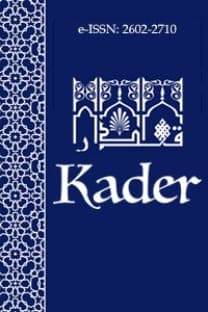Kant, Bergson ve İkbal’de Zaman Kavramı ve Bunun İkbal’de Özgür İradenin Yeniden İnşasına Etkisi
Kant, Bergson, and Iqbal on the Concept of Time and its Effect on Iqbal’s Reconstruction of Freewill
___
- Aydın, Mehmet. ‘Iqbal’s View of God’s Infinity’. Dokuz Eylül Üniversitesi İlahiyat Fakültesi Dergisi 2 (1985), 1–8.
- Barnard, G. William. Living Consciousness: The Metaphysical Vision of Henri Bergson. Albany: State University of New York Press, 2011.
- Bergson, Henri. An Introduction to Metaphysics. trans. T. E. Hulme. New York: G. P. Putnam’s Sons, 1912.
- Bergson, Henri. Creative Evolution. trans. Arthur Mitchell. New York: Random House, 1944.
- Bergson, Henri. Matter and Memory. trans. N. Margaret Paul - W. Scott Palmer. London: George Allen & Unwin, 1919.
- Bergson, Henri. Metafizik Dersleri: Uzay-Zaman-Madde. trans. B. Garen Beşiktaşlıyan. Istanbul: Pinhan Yayıncılık, 2014.
- Bergson, Henri. Time and Free Will: An Essay on the Immediate Data of Consciousness. trans. F. L. Pogson. New York: Dover Publications, 2001.
- Bouton, Christophe. ‘The Emergence of Time: Kant, Bergson, and Modern Physics’. KronoScope 13/1 (2013), 96–111. brill.com/kron
- Carson, Emily. ‘Metaphysics, Mathematics and the Distinction Between the Sensible and the Intelligible in Kant’s Inaugural Dissertation’. Journal of the History of Philosophy 42/2 (2004), 165–194.
- Caygill, Howard. A Kant Dictionary. Oxford: Blackwell Publishing, 2009.
- Diagne, Souleymane Bachir. ‘Bergson in the Colony: Intuition and Duration in the Thought of Senghor and Iqbal’. Qui Parle 17/1 (2008), 125–145.
- Gözkân, H. Bülent. Kant’ın Şemsiyesi - Kant’ın Teorik Felsefesi Üzerine Yazılar. Istanbul: Yapı Kredi Yayınları, 2018.
- Guerlac, Suzanne. Thinking in Time: An Introduction to Henri Bergson. New York: Cornell University Press, 2006.
- Hassan, Riffat. The Main Philosophical Idea in the Writings of Muhammad Iqbal (1877-1938). Durham: Durham University, Doctoral Thesis, 1968. http://etheses.dur.ac.uk/7986/
- Hassan, Riffat. ‘The Meaning and Role of Intuition in Iqbal’s Philosophy’. Iqbal Review 26/1 (1985), 67–99.
- Heimsoeth, Heinz. Kant’ın Felsefesi. trans. Takiyettin Mengüşoğlu. Ankara: Doğu Batı Yayınları, 2012.
- Holzhey, Helmut - Mudroch, Vilem. Historical Dictionary of Kant and Kantianism. Oxford: Scarecrow Press, 2005.
- Iqbal, Muhammad. The Reconstruction of Religious Thought in Islam. Stanford: Stanford University Press, 2013.
- Jordan, Bruno. ‘Kant and Bergson’. The Monist 22/3 (1912), 404–414. http://www.jstor.com/stable/27900386
- Kant, Immanuel. ‘Concerning the Ultimate Ground of the Differentiation of Directions in Space’. trans. David Walford - Ralf Meerbote. Theoretical Philosophy, 1755-1770. 361–372. New York: Cambridge University Press, 1992.
- Kant, Immanuel. Critique of Pure Reason. trans. Paul Guyer - Allen W. Wood. New York: Cambridge University Press, 1998.
- Kant, Immanuel. ‘On the Form and Principles of the Sensible and the Intelligible World [Inaugural Dissertation]’. trans. David Walford - Ralf Meerbote. Theoretical Philosophy, 1755-1770. 373–416. New York: Cambridge University Press, 1992.
- Kant, Immanuel. Universal Natural History and Theory of the Heavens. trans. Ian Johnston. Arlington: Richer Resources Publication, 2008.
- Küçükalp, Kasım. ‘Süreç Teolojisi ve Muhammed İkbal’. Hece 193 (2013), 302–309.
- Mohomed, Carimo. ‘“The Days of God”- Muhammad Iqbal’s Conception of Time and History’. Journal of Islamic Thought and Civilization 7/ (2017), 1–17. https://doi.org/10.29145/2017/jitc/72/070201
- Mohomed, Carimo. ‘Towards a Final Combination - Muhammad Iqbal’s Philosophy of History’. Journal of Philosophy and Ethics 2/1 (2020), 17–31.
- Mohomed, Carimo. ‘Towards a Final Combination: Muhammad Iqbal’s Philosophy of History’. Waikato Islamic Studies Review 6/2 (2020), 21–35.
- Popp, Stephan. ‘Muhammad Iqbal – Reconstructing Islam along Occidental Lines of Thought’. Interdisciplinary Journal for Religion and Transformation in Contemporary Society 5/ (2019), 201–229.
- Raju, P. T. Idealistic Thought of India. London: George Allen & Unwin, 1953.
- Shabel, Lisa. ‘The Transcendental Aesthetic’. The Cambridge Companion to Kant’s Critique of Pure Reason. ed. Paul Guyer. 93–117. New York: Cambridge University Press, 2010.
- Wheeler, Richard S. ‘The Individual and Action in the Thought of Iqbal’. The Muslim World 52/3 (1962), 197–206.
- Yayın Aralığı: 2
- Başlangıç: 2003
- Yayıncı: Mehmet BULĞEN
Klasik Dönem Kelâmında Bilim ve Felsefe: Kelâmın Dakîk ve Latîf Konuları Ekseninde Bir Değerlendirme
Mehmet BULGEN, Çevirmen: Mehmet BULGEN
Kant, Bergson ve İkbal’de Zaman Kavramı ve Bunun İkbal’de Özgür İradenin Yeniden İnşasına Etkisi
Baki KARAKAYA, Asiye Şefika Sümeyye KAPUSUZ
Tarihsel ve Çağdaş Yönleriyle Heterodoks Dinî Bir Kimlik Olarak Deizm
